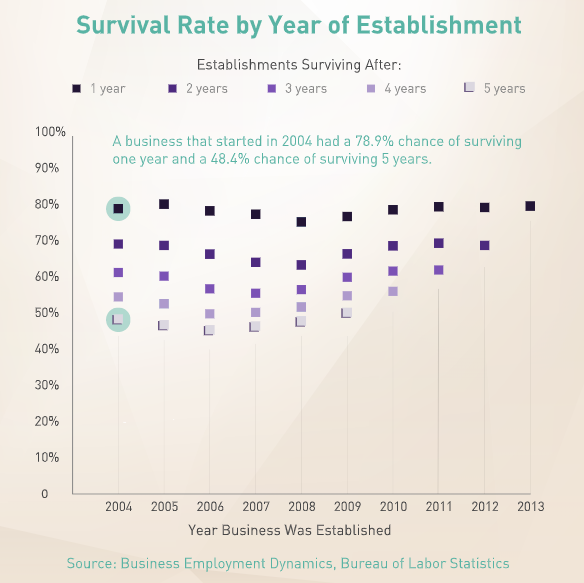9 Ways CRM Software Can Change Your Small Business
The first five years of a small business is critical because this determines its longevity. If you make it past that, you can give yourself a pat on the back. After all, less than 50% of small-sized enterprises make it to their fifth year, as per Forbes. However, there are still hard days ahead. If you want to keep your doors open, there are multiple factors you have to consider and one of them is your relationship with your customer base.

The Bureau of Labor Statistics revealed that businesses have less than 50% chance of making it past the five-year mark.
A U.S. Bank research shows that 82% of businesses tank because of ill-managed cash flow. Customer spending is in the decline so you have to be smart with how you do business, especially in terms of finances. Accounting applications can help in that regard but they are not designed to aid you in getting more people to spend their money on your products or services. For that, you need to turn to CRM software.

1. Lets you work with complete and accurate data
Some of the best CRM software solutions offer many data fields that let you gather customer information like name, birthday, telephone or mobile number, home address, and workplace address. Since you can see easily on the screen which areas have not been filled up, you can get in touch with your patron or search for the information elsewhere to ensure that you have a complete profile.
Once you have organized your customer data, you can be confident that you can understand your clients better.
2. Creates streamlined communication flows
With your employees able to access essential customer information in a CRM, anyone can provide assistance to clients. This means that whenever the patron’s main point of contact is unavailable, another member of the team can step in and do as good a job as their colleague.
In other cases, this may not be possible because it would be difficult for a client to adjust to someone who does not understand their needs very well. Having a CRM software for small business can resolve this since detailed customer information is accessible to anyone who needs them.
This means that client assistance can be done by anyone to prevent workflow bottlenecks and to keep customer satisfaction levels up.
3. Elevates customer experience
When a customer contacts you to resolve a problem, they expect answers fast. Their time is precious and every second that their issue is not fixed, they experience bottlenecks in their workflow. This can lead them to lose money since they may have to pay overtime fees to workers and lose customers they are unable to attend to immediately. This can cause friction between you and your client and can even cause you to lose their trust and loyalty.
Having a CRM in your toolbox can help you mitigate and avoid such situations. Since you can draw customer information plus their history with your small business fast, you can also secure a solution rapidly. And in case a solution is not readily available or discernible, the main representative can reach out to the rest of the team for assistance. This creates a collaborative environment within your company and also elevates employees’ problem-solving skills. Moreover, your customer support becomes more reliable and expeditious.

The American Express 2017 Global Customer Service Barometer revealed that Singaporeans are the most exacting consumers.
For customers, it creates a good experience. This is a boon for your establishment since buyers do push through with a purchase or conduct repeat business with an enterprise because of this, according to the American Express 2017 Global Customer Service Barometer.
4. Removes redundant tasks from your daily processes
Monitoring leads, tracking customers, and discovering new sales opportunities should be the main mission of a business, especially a small one, to grow. Oftentimes, though, these things take a backseat because of redundant, yet important, tasks that take up most of the employees’ time. When you subscribe to a CRM, you can take these out of the way because you can rely on the solution’s automation capabilities. As a result, your sales representatives can put their minds on getting leads to convert and existing customers to buy again and stay.
5. Offers visibility into your sales team’s performance
Even if you have a CRM, you still need a team of sales representatives to find, nurture, and convert leads. They are essential to the growth of your small business, but more important than gathering people to bring in revenue is making certain that these individuals are the right ones for the job.
Though a CRM is designed mainly for tracking leads, customers, and contacts, it is also capable of showing you the performances of your sales team members. When you choose the right one, a CRM system can stimulate your business’ growth. That is because it does not only provide an overview–it offers a drill-down look into each representative’s sales statistics. You can see who is bringing in more customers and who is the most efficient worker. With this, you can give a reward to your top performers and gamify the task to inspire others to work harder.
6. Provides actionable insights
Getting even a simple CRM for small business can bring a lot of advantages. That is because most of the CRMs available in the market today have powerful reporting capabilities. They can connect with various software you have to draw information for comprehensive reports. They then deliver statistics and insights to give you a bird’s eye view of your enterprise as well as provide you with the specifics. With these reports, you can maximize your time and decide the future direction of your business at a quick glance.
7. Helps you discover more sales opportunities
The more information you have about your customers, the more you are able to discover new sales opportunities. They present themselves when you analyze your buyers’ behaviors, your target markets’ needs and wants, and the latest market trends. These are possible when you have a CRM that can highlight favorable circumstances. As such, you can act on the opportune chances as soon as they are visible to ensure that you gain a foothold in the market and have an edge over the competition.
8. Paves the way to informed marketing strategies
Some of the best CRM for small business are equipped with connectors or integration functions. You can leverage these not just to smooth out your back-office processes, but also to level up your marketing. Since it can draw information from different systems, your CRM allows you to see which avenues have the highest engagement and conversion rates. You can then focus your marketing attention on these platforms and capitalize them for significant returns.
9. Assists you in scaling for the future
Your small business may not be small always. As you cater to more customers, demand will increase and you may need to expand to other locations or at least grow your current operations. When that happens, you have to have a software that can accommodate the accrual of data and your evolving requirements. A CRM is one such tool, as many vendors design their platforms to scale with your company. Even if you start with a low-tier package, you will have access to upgrades and more advanced features when you need them.
Transforming your business with a CRM software
Customers want to be understood, and a CRM application can help you fulfill that requirement. With it, you can organize customer information, create a smooth communication process, and revolutionize your customer service. All these lead to the greater satisfaction of your client base and puts your business at an advantage in your niche.